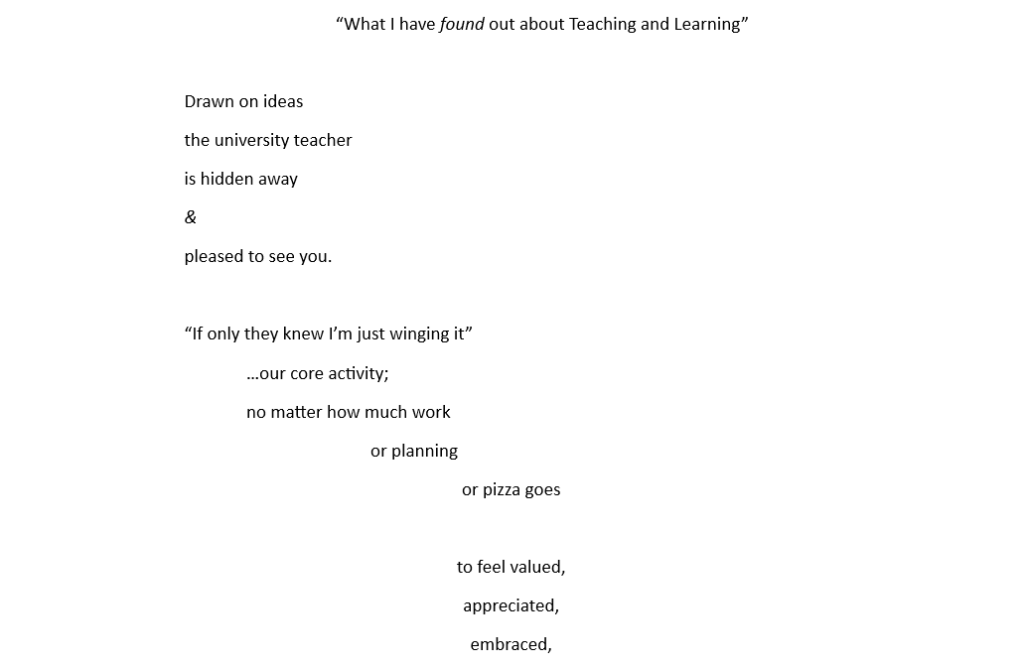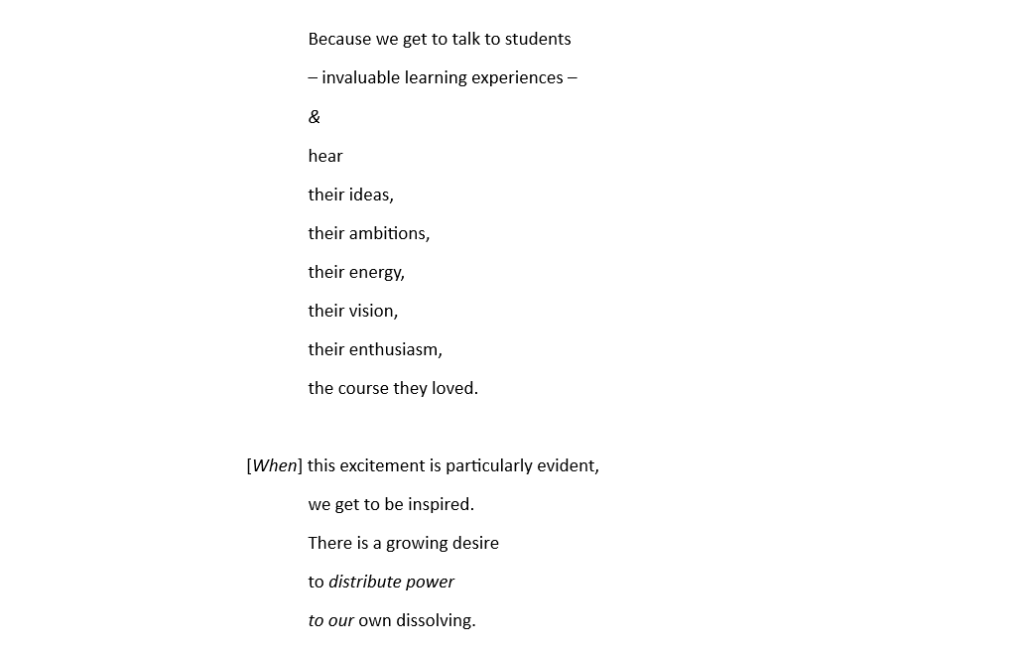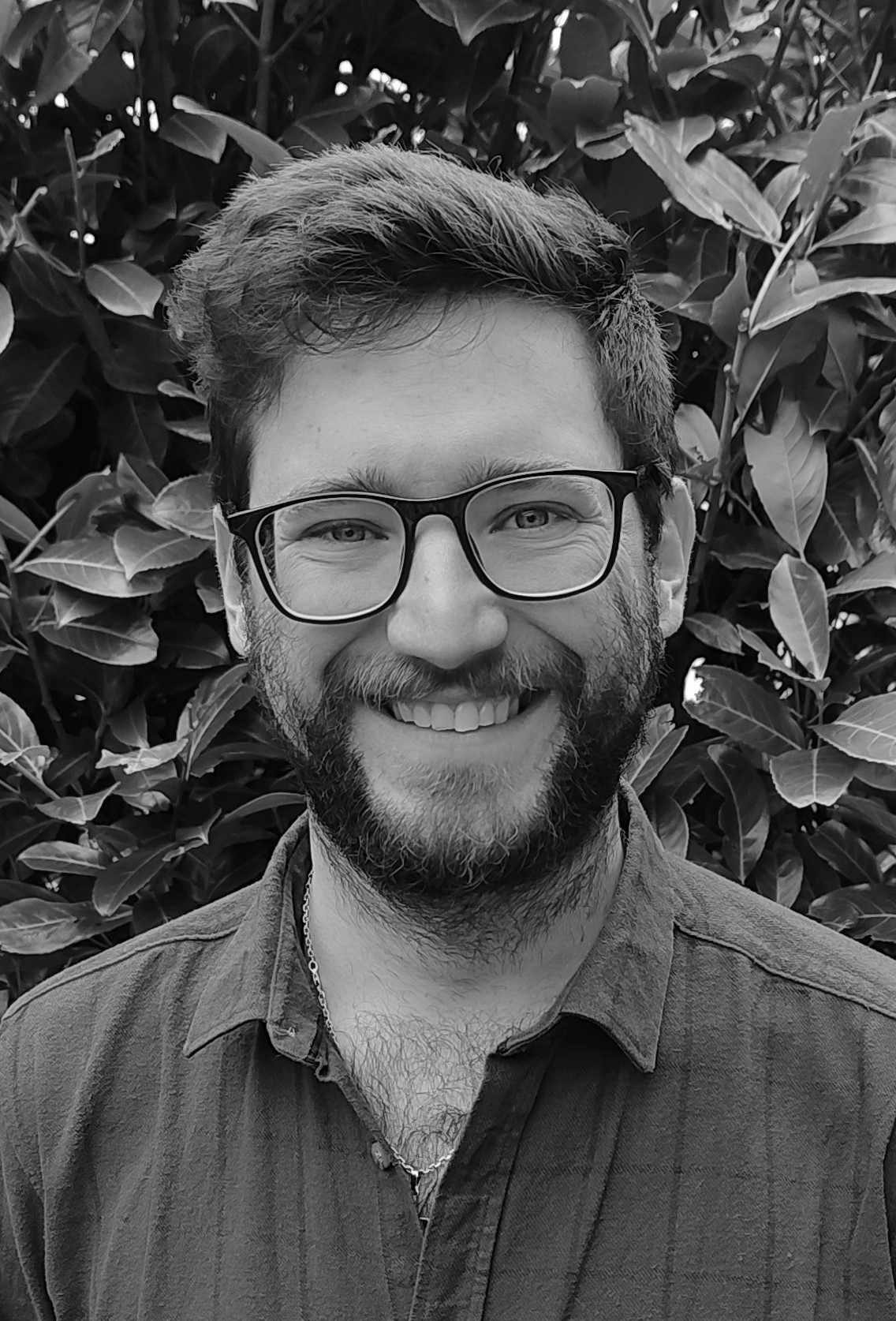
In this post, we share with you the Collegiate Commentary from our latest Teaching Matters ‘Five things’ reflective round-up: Five lessons learned from the Engaging and Empowering Learning at the University of Edinburgh, co-edited by Dr Kirsten Cowan. In this commentary, Felipe Sánchez Burgos offers his reflections on ‘What I have found out about Teaching and Learning’ through the lens of these nine blog posts. Felipe is a Lecturer in Educational Psychology at Universidad Católica del Maule, Chile.
These reflections in this Commentary compile my experiences in Chile – at Pontificia Universidad Católica de Chile, Universidad de los Andes and Universidad Católica del Maule – and at Lancaster University (LU) in the UK. I reflect on what I found now, through the text, through my memories, through years of HE work. A first read of the ‘Engaging and empowering learning’ series reverberates an integration of affection and intellect as part of knowing, and so I offer a found poem:



Engaging and empowering learning in Higher Education feels like a call for student centredness, for equity, diversity and inclusion in a strong sense beyond surface, cosmetic changes towards deep, structural ones – infrastructural even. Students are the ones here to learn, it is them who should be on a stage and not the lecturer. The show is about them.
Thinking about Professor Noel Entwistle’s post, ‘Ways of thinking about teaching and learning’, I find myself in reverie of the times I was collaborating with Dr Christian Sebastián and Dr María Rosa Lissi at Pontificia Universidad Católica de Chile. As a young Teacher Assistant, I learnt from them that learning is a revolution for the learner – as Vygotski would argue. They were all about challenging students, to go beyond their usual ways of thinking, supported by group discussion, games and (the at times nerve-wracking) conceptual maps. In our experience, struggling with hard concepts is indeed both a pain and a joy. ‘Different ways of thinking’ for me is a call back to those times and the intuition of what is now called Epistemic Emotions.
The challenges of being an undergraduate are often accompanied by emotional challenges too. Commenting on Michelle King-Okoye’s and colleagues’ post, ‘The ambassador scheme: Supporting student carers at The University of Edinburgh’, I think about what Universidad Católica del Maule does currently to support the needs of the students through the Centre for Learning Support. Their work is tailored towards supporting students, and yet the usual struggle in reaching out and actually supporting those in need affects them too. To get to more students, University of Edinburgh’s ambassador scheme may be something to look at for further development.
Still, the emotionality of the HE experience is not only something of concern when talking about students: lecturers’ experience of teaching is quite emotional too (you may find Sánchez, 2025 of interest for this point). One of the many emotional challenges of teaching often includes dealing with Impostor syndrome and so I reflect on Will Zhnag’s post, ‘Thoughts on impostor syndrome: Shifting focus from yourself to others‘. This was often a topic of discussion amongst my PhD friends at Lancaster University and, to my surprise, across the world too. As I took part of the 9th International Symposium on Poetic Inquiry, it was clear to me through our collective conversations that most people feel like this. Even when esteemed and caring academics like Rev Dr Sarah Penwarden and Dr Esther Fitzpatrick tell me to my face that I do belong there, there is always a bit of doubt in me.
Maybe we should try to learn to look outwards, as Will says: to feel more comfortable and authentic in being ourselves. I want to extend this reflection towards the piece on Dr Claire Haggett’s post, ‘The importance of academic relationships‘. As the undergraduate years unfold, I imagine those (trans)formative years as a time and space for being socialized into feeling authentic and comfortable with our academic selves. I go back to my years at Universidad de los Andes, Chile, working with Antonietta Ramaciotti. As their School of Education tries to centre on the students, Antonietta was driven by a deep care towards our students. I’ve found out that the care we share with others, our students, peers, lecturers and colleagues is key to the higher education experience. To those reading this, I can only offer these words: cherish your students and find ways to keep them around for longer. We need them more than they need us.
Our goal should be to share with them our love for our subject, field, discipline and work. Through enjoyment of the craft we come together, and I see that also in the post by Christina Starko, ‘Excitement grows as The University of Edinburgh students tackle exceptional learning’. Academic activities at any educational level that may speak to the enjoyment, pleasure and sense of purpose of the students should not only be included in the curriculum, but be carefully and lovingly crafted to be positively experienced by the students.
At Universidad Católica del Maule, Chile, I’ve had the privilege to work with Claudio Rojas Jara in teaching Community Psychology. We offer the students an Early Practice Activity, aimed at engaging with the local community in a closer way, looking out for opportunities for students to work towards a more equitable and socially-just psychological practice with their communities. As with Christina Starko’s work, we envision learning experiences that shift the focus from the classroom to the real-world, in line with the actual needs of real people.
I want to close reflecting on Dr Brian McGrail’s post on ‘Depowering education’. As part of the wider Decolonising Lancaster University (DLU), I collaborated with Dr Sunita Abraham and Dr Richard Budd as they pursued an effort to depower themselves as lecturers through GTA collaboration (Abraham et al. 2024). Taking depowering further, I found myself remembering the push done at Universidad de los Andes’ Centre for Teacher Innovation (CID), for building teaching/seminar rooms for active learning. At the time, discussions were held for and against building big lecture theatres.
Let’s hold on to that discussion a little further now: arguably, infrastructure plays a key part – revolutionary even – in promoting active learning, and so actively depowering lectures/lecturers. By focusing on students – but really, wholly, unequivocally doing it – we are dissolving both the lectures and lecturers by the same movement: let the student take the stage to/for learning, and the lecturers sit and listen to/for teaching.
 Felipe Sánchez Burgos
Felipe Sánchez Burgos
Felipe is a Lecturer in Educational Psychology at Universidad Católica del Maule, Chile. He is a doctor in Educational Research, and is often looking at making things a bit more complicated than necessary! He’s interested in all things Higher Education, learning futures & traditions, times, spaces & rhythms; socio-constructivism & reflection, emotionalities & experiences, sustainability, the arts, amongst other things. He’s an amateur artist (as in, would love to be one), who does art-based research to create novelty at the edges of scientific research and art, fostering a dynamic, playful and transdisciplinary approach to knowledge construction. You can follow Felipe on LinkedIn and view his scholar profile.


